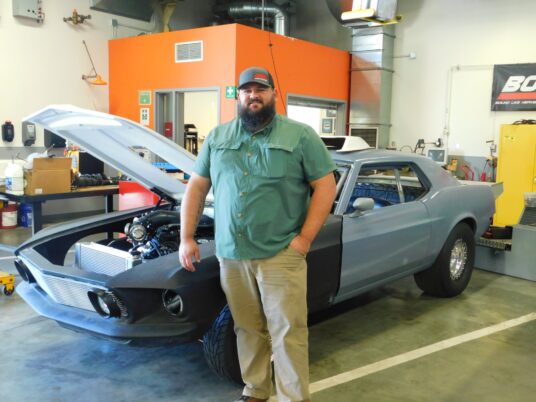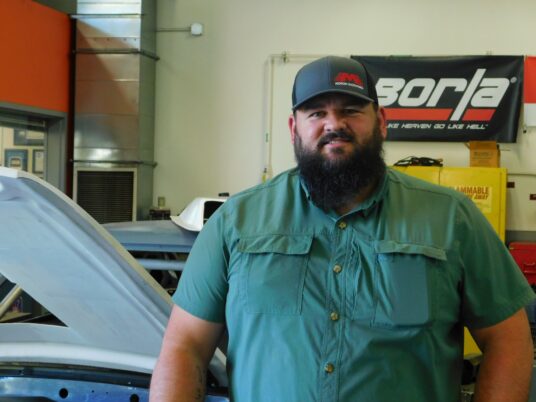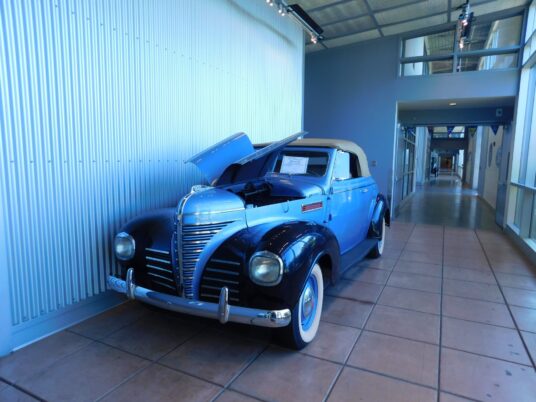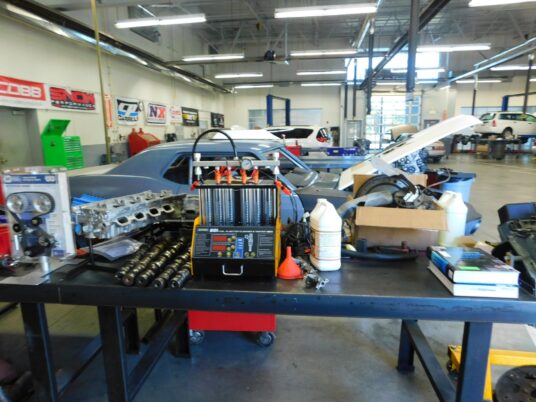Beyond the Classroom: Nicholas ‘Nick’ Eilers, Voice of the Vehicles

By Marcia Wilson
CPTC: Beyond the Classroom is a relaxed interview process where we pull questions out of a selection of cards, inspired by the Wild Cards with Rachel Morgan podcast. In other words, I don’t know what question I’m going to select for you, any more than you do!
Nick: [laughs] All right!
1) Hello, There: First of all, how would you introduce yourself to someone who has no idea who you are, or what you do here at CPTC?
Nick: My name is Nick Eihlers and I teach Engines and Engine Performance for the Automotive Technology program, engines, and performance. In this we diagnose, adjust, repair, or overhaul automotive engines!
CPTC: Thank you! Now, let’s pull out something from the mix of cards.
2) Human Stories & Values: School and work can be challenging. What do you feel is your big motivator when it gets hard?
Nick: My family is a big motivator! I really enjoy spending time with my wife and kids, and I look forward to going home to them!
3) Personal Questions: Pretend you are sitting down and talking with your younger self. What do you think would surprise the Younger Nick the most?
Nick: I’m a teacher! [laughs hard] Growing up, I had a… certain opinion about school! I had a lot of ‘why am I here??’ moments!
CPTC: And now look what happened!
Nick: And now look what happened!

4) What about Technical College? What’s one—just one!—stereotype about technical college that you’ve found isn’t true?
Nick : [chuckles at the thought of just one stereotype, but then turns serious and thoughtful] I feel that there’s a sense that technical colleges are for lower-intellect people. I mean, there are a lot of jobs that don’t require a high score… We need a wealth of knowledge to do technical skills correctly, such as welding, and building engines!
For many years, you had to have a four-year degree. That’s not so, now. Now you see people with those degrees that can’t get a good job. Lots of people can still get work with the training they get from a technical school.
CPTC: Thank you, that seems to be the bugbear, isn’t it? Technical School doesn’t mean ‘lesser!’ Now, let’s see what the next cards is. Here’s another personal question card, if you don’t mind?
5) In your opinion, what’s the most useful skill you’ve learned—inside or outside the classroom—that people might not expect?

Nick: “Hmmn… useful skill… [thinks about it for a moment]. Well, growing up, my stepdad…if I asked him a question, his go to was to tell me, ‘figure it out.’ This figure it out skill has saved me a lot of money, and given me the means to learn many new skills. I might not know how to do it, but I will figure it out. This is a learning environment.
Here, Nick’s eyebrow goes up: “I’d much rather answer a question than fix what you broke.”
CPTC: Oh, here’s a fun one! What’s your favorite food? Do you have one?
Nick: FRESH BAKED BREAD! [this was said with great enthusiasm]
CPTC: Here’s a question that popped up when a visitor came to campus looking for an e-station: What do you think of the current push within the industry for e-cars?
Nick: [without missing a beat] Electric vehicles are pricey for something with realistic range. I know I personally wouldn’t want to be the second owner of an EV and potentially get stuck with the cost of replacing batteries. We are seeing many auto manufactures canceling or delaying electric vehicles they planned to produce and prioritizing hybrids.
CPTC: I really have a strong urge to ask you further questions about your field regarding the current ‘craze’ for AI in some applications. This is heard a lot. Can you expand your thoughts on this subject?
Nick: In regards to AI use, It can be a useful tool when used properly. I try to stress the importance of using it to enhance your own work, not just clicking a couple of buttons to copy and paste what it has generated for you. It’s also important to know that AI is not always right, if you ask it for example, what is the torque specification of the harmonic balancer bolt on a small block ford? It will tell you a range of 35 to 90 pound feet of torque depending on a number of variables. It will also list the sources it used to come up with that information. It’s up to you as a user to determine is that plausible, and what are your variables to get the correct specification?
CPTC: Nicely said! Now, here’s a question that pops up regularly:

6) Do you still do the customer request for car repairs?
We do still work on customer cars is the short answer. To expand, the repair must align with what is currently being taught during the quarter, provide instructional value to the students, and get instructor approval. Requests for work can be made on the CPTC website underneath the community tab.